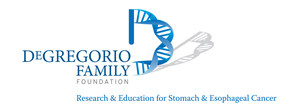Grant Awarded to Define Gene Dependencies in Whole-Genome Doubled Esophageal Adenocarcinomas
NEW YORK, Oct. 6, 2021 /PRNewswire/ -- The DeGregorio Family Foundation has awarded $250,000 to Neil J. Ganem, PhD, Associate Professor of Pharmacology and Medicine, Section of Hematology and Medical Oncology, Department of Pharmacology, Boston University School of Medicine. Dr. Ganem is working on defining gene dependencies in whole-genome doubled esophageal adenocarcinomas to ultimately discover new drug targets. Rates of esophageal adenocarcinomas have risen dramatically in recent decades and it is a highly deadly cancer.
Non-cancerous esophageal cells maintain their genetic information on 23 pairs of chromosomes, and numerous cellular controls exist to help ensure that this state is maintained across successive cell divisions. Despite these controls, errors can occur that result in a phenomenon known as whole genome-doubling, in which cells acquire twice as much DNA as normal (i.e., 46 pairs of chromosomes). Whole genome-doubled esophageal cells (WGD+) are extremely common in the pre-malignant condition Barrett's esophagus. The vast majority of these WGD+ cells are benign and fail to proliferate; however, rare WGD+ cells with strong proliferative capacity occasionally arise, and these cells have the capacity to drive tumor development. A staggering ~60% of all esophageal adenocarcinomas are thought to arise from WGD+ cells present in Barrett's esophagus.
Recent work from Dr. Ganem's lab has demonstrated that while whole genome-doubling confers traits that favor the formation of tumors, it also imposes numerous physiological stresses upon cancer cells. With support from the DeGregorio Foundation, the Ganem lab will test its hypothesis that WGD+ esophageal adenocarcinoma cells must acquire specific genetic adaptations to tolerate the numerous defects imparted by a doubled DNA content, and that these tumor cells may therefore possess specific genetic dependencies not present in normal, healthy cells. Identifying these adaptations and gene dependencies to discover new drug targets in WGD+ esophageal adenocarcinoma cells is the overarching goal of this study.
In 2020, gastric and esophageal cancers combined to kill over 1.3 million people worldwide— making it the second-leading cause of cancer-related death. Patients continue to face poor prognoses following gastric and esophageal cancer diagnoses due to their chemo-resistant behavior and ability to metastasize.
The DeGregorio Family Foundation, founded in 2006 after a 10th member of the DeGregorio family died of stomach cancer, has raised more than $5 million to fund innovative research focused on curing gastric and esophageal cancers. Lynn DeGregorio, President and Founder, stated, "We are honored to fund grants for deserving research that has the potential to significantly improve how we approach and treat gastroesophageal cancers."
Commenting on his award, Dr. Ganem said, "Support from the DeGregorio Foundation will enable us to conduct this innovative study, which we feel has the strong potential to reveal new strategies to specifically target and kill WGD+ esophageal adenocarcinoma cells while sparing the normal, non-cancerous WGD– cells that comprise normal human tissue."
Media Contact:
Sarah Fletcher
917-855-7994
SOURCE DeGregorio Family Foundation

WANT YOUR COMPANY'S NEWS FEATURED ON PRNEWSWIRE.COM?
Newsrooms &
Influencers
Digital Media
Outlets
Journalists
Opted In






Share this article